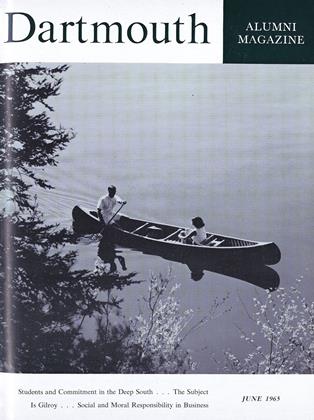ABOUT THOSE ROSES or HOW NOT TO DO A PLAY AND SUCCEED and the Text of THE SUBJECT WAS ROSES.
JUNE 1965 PAINE KNICKERBOCKER '33ABOUT THOSE ROSES or HOW NOT TO DO A PLAY AND SUCCEED and the Text of THE SUBJECT WAS ROSES. PAINE KNICKERBOCKER '33 JUNE 1965
By Frank D. Gilroy '50. NewYork: Random House, 1965. 211 pp.Illus. $4.95.
Frank D. Gilroy, who attended Dartmouth before spending a year at the Yale Drama School, wrote a play between screen jobs in 1960-61. He sent it to his agent in April 1962, and The Subject Was Roses finally opened in May 1964, becoming the late blooming Cinderella of the last Broadway season.
"It opened on Broadway with a producer who had never produced a Broadway play; a director who had never directed one; a scenic artist who had never designed one; a general manager who had never managed one; and three actors who were virtually unknown," he suggests in the preface to his book, and now, almost a year later, it is still flourishing in New York.
Gilroy had written many television shows, and then won an "Obie" in 1962, when his off-Broadway presentation, Who'll Save thePlowboy? was selected as the Best American Play of the year. But Roses was designed for the big jump uptown, and during the period between first sending it east to be read, and its opening curtain, he kept a diary.
William Gibson had done somewhat the same in his Seesaw Log but his problems were different. Gibson's play, Two for theSeesaw quite quickly interested a star, Henry Fonda, and Gibson's problems had more to do with rewriting and shaping his work in order to please those concerned with it than he did with its actual production.
The Subject Was Roses was brought in at under $38,000 which in itself is a near miracle. (Kelly, a musical produced by men who believed they were wary denizens of the Broadway jungle, cost $650,000, and lasted one night.) Roses had an advance sale of $165, suffered losses for four weeks which necessitated borrowing an additional $10,000, and it did not have a sold out house until its 136 th performance. Gilroy does not reveal further figures, which is mildly regrettable because certainly a part of the story is when its investors started collecting dividends.
The play describes the return of a young soldier in 1946 to the modest Bronx flat of his mother and father. The household is neither serene nor charming, but the interaction of the characters is unsentimental and moving, and at the end of the play, much of which is funny, all three understand one another a great deal better.
Some eighteen months before it opened on Broadway, Karl Maiden, E. G. Marshall, Walter Matthau, Arthur Kennedy, Dan Dailey, Maureen Stapleton, Judy Holliday, Geraldine Page, Teresa Wright, and others had already turned it down.
Lars Schmidt, the husband of Ingrid Bergman, wanted to stage its world premiere in Stockholm, but Gilroy decided that if it were not a hit there, not only would its reputation be tarnished, but he would never know why it had failed, and so he stubbornly stuck to the idea of a full-scale Broadway production.
He saw Jack Albertson playing in Burlesque in a production at UCLA. Albertson is a man who has been in countless movies, and whose name you never can remember. He was hardly a come-on for investors, but Gilroy was convinced he was right to play the father. Albertson thought so too, until the spectre of returning to Broadway loomed up, close at hand, and then he needed a great deal of reassurance, all of which Gilroy describes in absorbing detail.
Irene Dailey, Dan's sister, was selected as the mother, and to play the kid, an attractive young actor named Martin Sheen, who was at first too cocky, got the nod. There were insufficient funds to permit out-of-town tryouts, so after a few previews in New York, the play opened close to the end of last season.
Walter Kerr called it "the most interesting new American play to be offered on Broadway this season"; Howard Taubman acclaimed it as "honest and touching," and Norman Nadel declared that "from this day forward, Gilroy is a major playwright." About Those Roses is dramatically shaped because of the play's modest beginnings and its eventual triumph, but this account is also an amusing and enthralling peek into the hazards of the American theater, one invaluable for any hopeful playwright who feels a modest play of integrity is worth fighting for.
Drama Critic, San Francisco Chronicle
 View Full Issue
View Full Issue
More From This Issue
-
 Feature
FeatureStudents and Commitment in the Deep South
June 1965 By BERNARD E. SEGAL '55, -
 Feature
FeatureTHE SUBJECT IS GILROY
June 1965 By RAYMOND BUCK '52 -
 Feature
FeatureSocial and Moral Responsibility in the Modern Corporation
June 1965 By RODMAN C. ROCKEFELLER '54 -
 Feature
FeatureRETIRING PROFESSORS
June 1965 -
 Article
ArticleWITH THE BIG GREEN TEAMS
June 1965 By ERNIE ROBERTS -
 Article
ArticleTHE UNDERGRADUATE CHAIR
June 1965 By BOB WILDAU '65
Books
-
 Books
BooksTHE FIVE HUNDRED HATS OF BARTHOLOMEW CUBBINS
January 1939 By Alexander Laing '25 -
 Books
BooksTHE PASSING OF THE SAINT
April 1941 By Andrew G. Truxal -
 Books
BooksPOSSLQs
MAY 1982 By Gary T. Brooks '70 -
 Books
BooksV AS IN VICTIM
December 1945 By H. M. Dargan. -
 Books
BooksPoetic Institution
October 1980 By R. H. R. -
 Books
BooksCHRETIEN DE TROYES: INVENTOR OF THE MODERN NOVEL.
March 1958 By WILLIAM R. LANSBERG '38

